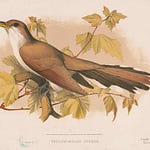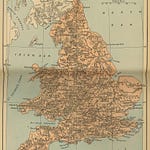There’s still time to take advantage of our Christmas Special from now through Epiphany — 25% off all new paid, gift, and upgraded subscriptions.
In 1926, the poet T. S. Eliot, a man of immense learning and relentless thought, entered the Anglican Church and became a Christian. “Oh dear,” said the novelist Virginia Woolf. “How can we invite him to our parties now?” For she and her husband, like all of the people in their fashionable set, were atheists. For Eliot to become a Christian, in her mind, was worse than, let’s say, if he had embezzled money from his bank, or if he had gotten tangled in a more lurid scandal. Things like that could be shrugged away. But you couldn’t shrug Christ away. What Eliot did crossed the line between the respectable and the despised. Why, the next thing you know, he could be at a Christmas service in Manchester singing hymns with ironworkers and their hard-handed wives and all their broods of children.
Eliot understood that divide as well as anyone. He’d written poems of despair, like “The Love Song of J. Alfred Prufrock,” and been cheered for it. Now he began to write poems of hope, and that’s what earned him the disdain of people like Virginia Woolf. We must be optimists in politics, I suppose, and despairing pagans in what matters most; while Eliot was quite incapable of being anything but a pessimist when it came to politics, but, in the end, he was a man of abiding hope in what matters most.
Yet he knew that the hope also meant that a corner must be turned, and that if Christ came to redeem the world, it meant that that world had to die, too. The old world could not be born anew unless it was first put to death. That was the case with the world of his personal life, the life of an American expatriate living in England and hobnobbing with everyone who was anyone in English arts and letters, and it was also the case for the wise men from the east following the star to Bethlehem, in our Poem of the Week, “The Journey of the Magi.” They were seeking the long-expected Messiah, and they found him, but what they found also was that they must die; the pagan world they took for granted was going to pass away forever.
You’ll notice in the poem that there are signs, too, not just the star above, but the three trees on the hillside, the six hands casting dice for pieces of silver, the empty wineskins kicked aside, the rushing stream beneath the snow line, and though the speaker of the poem, one of the three Magi, does not know what they mean, we do know. We see not just the birth of the Messiah foretold by the star, but his passion and death, foretold by those things the wise man sees along the way. “A sword shall pierce thy heart,” says the old man Simeon to Mary, when she and Joseph bring Jesus to the temple, to consecrate him to God. To follow the star to Bethlehem is also to follow the Lord to Jerusalem. What will happen then, again, the Magus does not know. We do know, and that is why, even though the poem ends with the weary old man saying that he would be glad to die now, we can take “another death” not as resignation but as a promise, a hope beyond death.
‘A cold coming we had of it, Just the worst time of the year For a journey, and such a long journey: The ways deep and the weather sharp, The very dead of winter.’ And the camels galled, sore-footed, refractory, Lying down in the melting snow. There were times we regretted The summer palaces on slopes, the terraces, And the silken girls bringing sherbet. Then the camel men cursing and grumbling And running away, and wanting their liquor and women, And the night-fires going out, and the lack of shelters, And the cities hostile and the towns unfriendly And the villages dirty, and charging high prices: A hard time we had of it. At the end we preferred to travel all night, Sleeping in snatches, With the voices singing in our ears, saying That this was all folly. Then at dawn we came down to a temperate valley, Wet, below the snow line, smelling of vegetation; With a running stream and a water-mill beating the darkness, And three trees on the low sky. And an old white horse galloped away in the meadow. Then we came to a tavern with vine-leaves over the lintel, Six hands at an open door dicing for pieces of silver, And feet kicking the empty wine-skins. But there was no information, and so we continued And arrived at evening, not a moment too soon Finding the place; it was (you may say) satisfactory. All this was a long time ago, I remember, And I would do it again, but set down This set down This: were we led all that way for Birth or Death? There was a Birth, certainly, We had evidence and no doubt. I have seen birth and death, But had thought they were different; this Birth was Hard and bitter agony for us, like Death, our death. We returned to our places, these Kingdoms, But no longer at ease here, in the old dispensation, With an alien people clutching their gods. I should be glad of another death.
Word & Song is an online magazine devoted to reclaiming the good, the beautiful, and the true. We publish six essays each week, on words, classic hymn, poems, films, and popular songs, as well a weekly podcast, alternately Poetry Aloud or Anthony Esolen Speaks. To support this project, please join us as a free or paid subscriber.
Christmas Discount Offers 2023
Upgrade to paid or give a gift subscription now through Epiphany!














Share this post